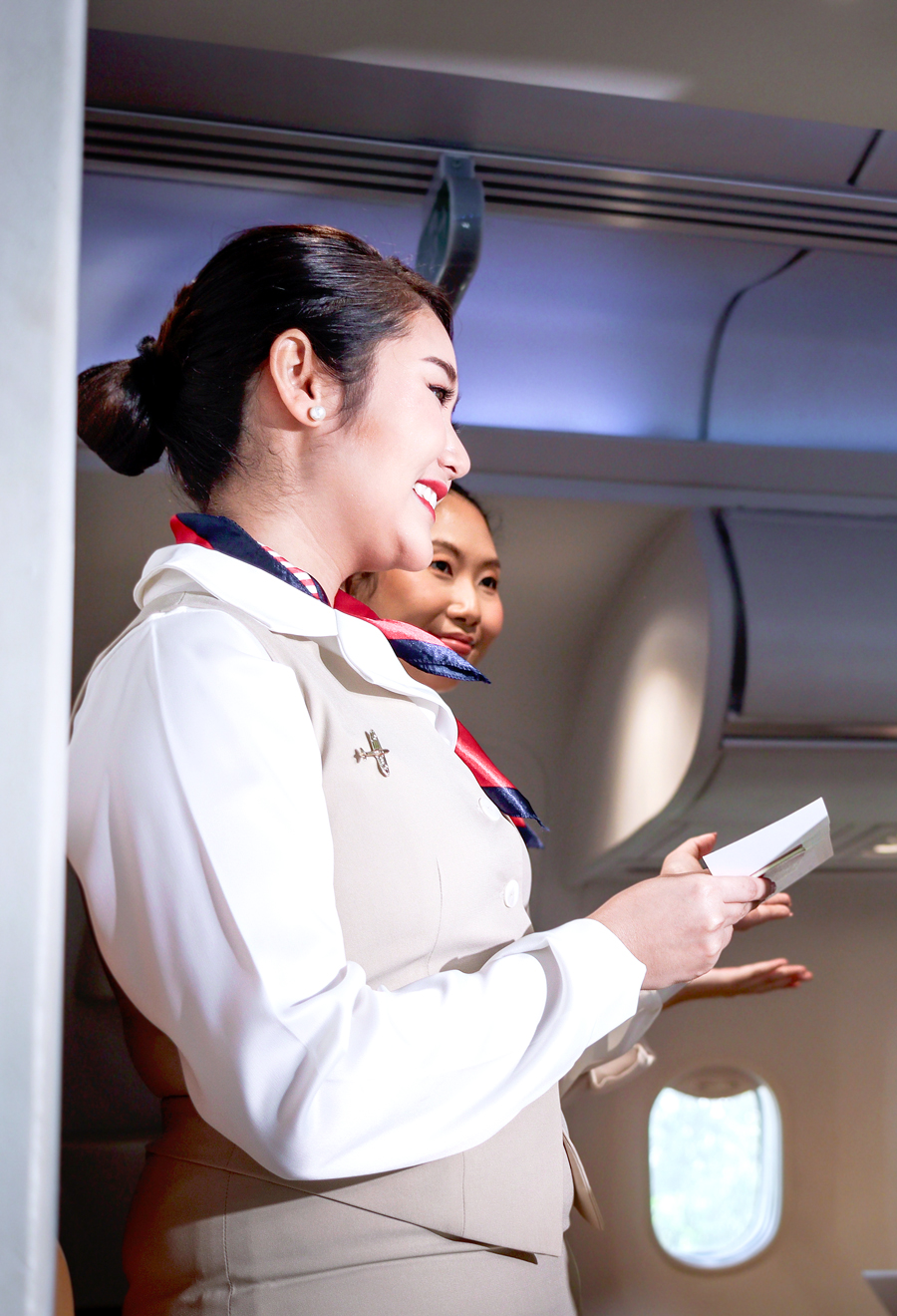Flight attendants are the unsung heroes of air travel, keeping us safe and comfortable during our journeys. But have you ever wondered what it’s like to take to the skies daily? While the average U.S. traveler flies only a few times a year, flight attendants might complete several flights in a single day. Because of this, their knowledge of airplane safety and etiquette is second to none. To get the inside scoop, we talked to five seasoned flight attendants (who asked to be identified by their first names only) from across the U.S. about what they wish passengers knew. Here’s a behind-the-scenes look at their jobs so you can become a better traveler.
Their Top Priority Is Safety
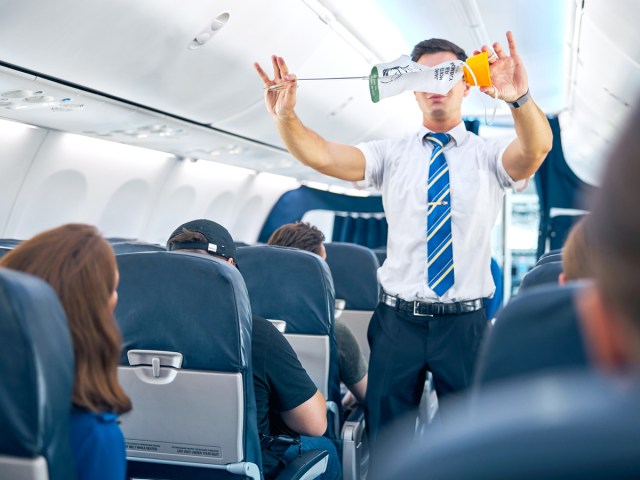
It’s unanimous: Safety is always first on the agenda for flight crews. “I know from the outside it looks like we’re just slinging drinks and snacks,” says Megan, an Orlando-based flight attendant for a major U.S. airline. “But in reality, we’re constantly on alert of our surroundings.” Flight attendants are prepared to handle almost any situation, from run-of-the-mill turbulence to medical emergencies or fires.
Cate, a Philadelphia-based flight attendant with over a decade of experience, says, “For me, the most difficult aspect of the job is people arguing with me when I ask them to do something that is an FAA regulation.”
The FAA is, of course, the Federal Aviation Administration, which establishes rules for the safety of all passengers and crew. All of the flight attendants we interviewed mentioned the importance of following them to prevent injuries and avoid fines — this is their top concern as soon as the cabin door closes.
Rachael, a Pittsburgh-based flight attendant, adds that while safety is No. 1, comfort is a close second. “You never know what someone is going through when they board an aircraft. They can be a nervous flyer, or they can be heading to a funeral. You just never know their situation,” she explains. Balancing safety and empathy is a big part of the job.
There’s One Rule Everyone Ignores
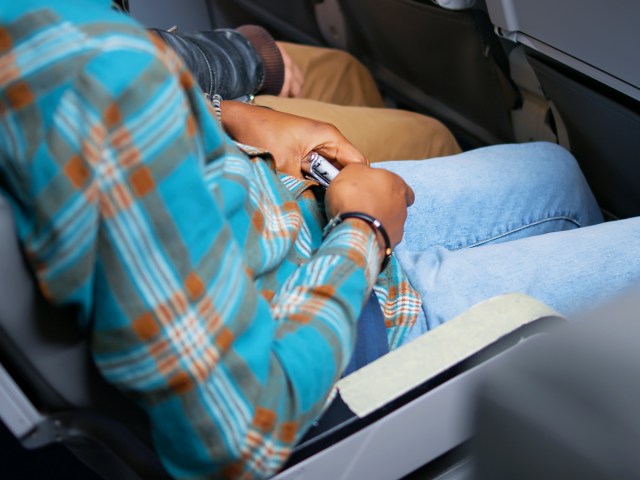
If there’s one rule passengers constantly overlook, it’s adhering to the “fasten seat belt” sign.
“I would say the seat belt sign is the most ignored sign in the world,” Rachael jokes. Many passengers treat the illuminated sign as more of a suggestion, but wearing your seat belt is imperative because turbulence can hit at any time — even if the sign is off.
“The pilots have better intel about turbulence,” Megan says. “We don’t always know when we’re going to hit a pocket of rough air like they do.” A good rule of thumb is to leave your seat belt buckled whenever you’re seated to avoid any unpleasant mishaps. (And it should go without saying, but don’t get up when the sign is on, even if it seems like smooth sailing at the time.)
Another common mistake? Unbuckling right when the plane touches down. According to flight attendant Kaitlyn, who also worked in the training department, “taxi is one of the most dangerous phases of flight.” Passengers run the risk of injury by unbuckling too soon, so always remain seated with your seat belt fastened until your plane arrives at its gate and the sign is turned off.
Luggage Storage Is a Serious Matter
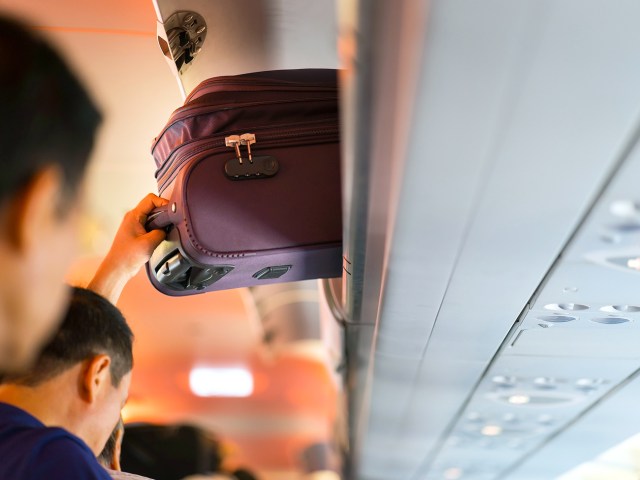
We’ve all struggled with overhead bins — but in-cabin luggage storage is a major concern for flight attendants, too. It’s important to stow your luggage correctly — bags should fit entirely under the seat in front of you.
“Please remember, the goal is to evacuate the plane in under 90 seconds,” Megan says. She explained that in studies conducted by the FAA, passengers tripped over their own luggage during real-life evacuation events. “It could save your life or the life of the person sitting next to you!” she adds.
Cate addresses another concern about in-flight luggage: Flight attendants are not supposed to lift your heavy bags. Their workers’ compensation program doesn’t cover any injuries they might sustain while doing so. “We can assist you in lifting, but if you can’t lift your bag alone, the best thing to do would be to check it to your final destination.”
Restroom Etiquette: When To Go (and When Not To)
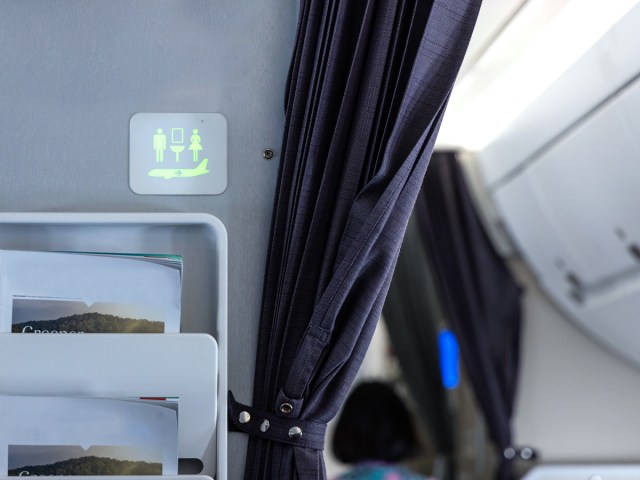
The airplane lavatory (aka the “lav”) isn’t anyone’s favorite place, but sometimes, using it is unavoidable. However, flight attendants do have some suggestions. Kaitlyn advises using the restroom in the terminal before you board. “Not only is it cleaner, but we are normally rushing for an on-time departure. Using the lav during boarding can delay the boarding process.”
If you have to use the lav during your flight, stick to these guidelines: Don’t use the restroom during boarding or deplaning, taxiing, turbulence, or when a flight attendant has a cart in the aisle.
They (Mostly) Don’t Get Paid During Boarding
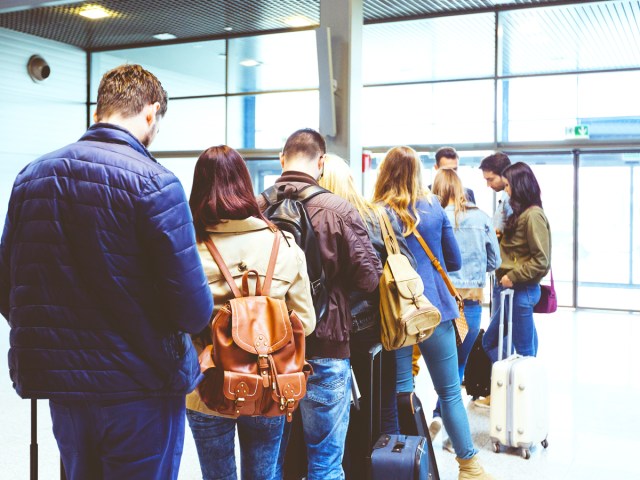
Have you ever been frustrated at a slow-paced boarding? Your flight crew likely is, too. After all, most airlines do not pay them during the boarding process. Rachael explains that at her airline, “We only get paid from doors closed to doors open.” This also means they aren’t paid while waiting at the gate or during delays due to maintenance or weather.
To help speed up the boarding process, Rachael suggests passengers come prepared: Know your seat number, have your personal items ready to go, and don’t block the aisles while digging through your bag.
All of these seemingly small tasks can help avoid major delays. To put things into perspective, if just 20 passengers spend 60 seconds blocking the aisle while rummaging through their bags, that amounts to a 20-minute boarding delay.
Deplaning can be just as frustrating, so Rachael urges passengers to wait their turn when the plane arrives at the gate. “Wait for the row in front of you to deplane before you start rushing forward. It’s like merging while driving a car. A nice zipper sequence makes things go a lot faster.”
They Often Get Blamed for Things Out of Their Control
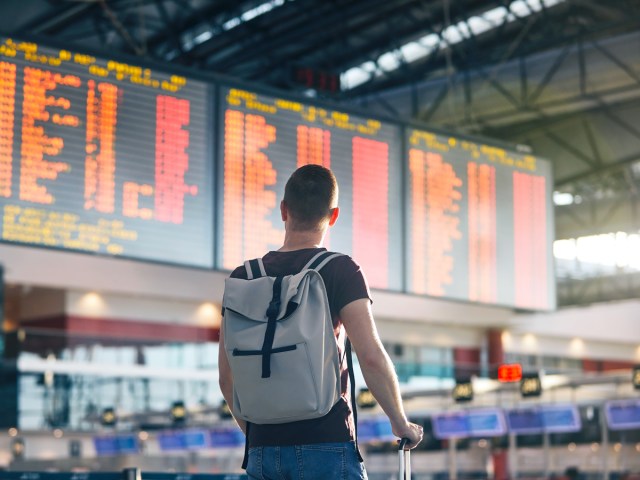
Weather delays, baggage fees, TSA lines, missed connections — flight attendants have zero control over most aspects of your journey. Their primary concern is keeping you safe and comfortable from the time you board until you arrive at your next gate.
One of the most common misconceptions is that flight attendants can delay a flight to wait for a late passenger. Rachael explains, “Flight attendants don’t have the authority to ‘hold a flight’ because we are landing late and someone needs to make their connection.” She adds, “We also get blamed for the Wi-Fi not working. That is totally above my pay grade, and I do not have an IT degree to figure it out.”
They Have a Few Other Pet Peeves
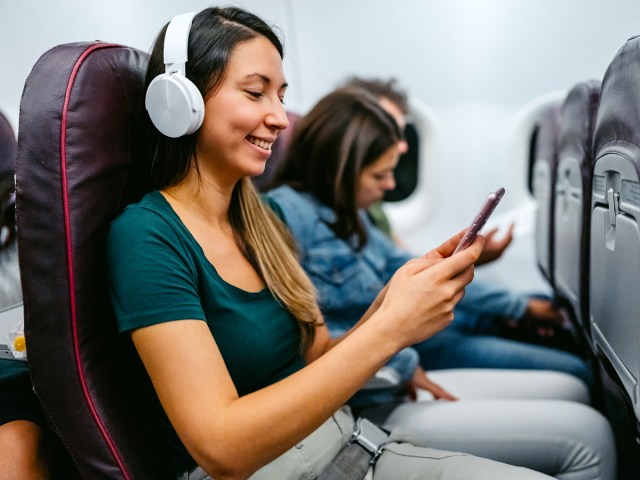
Flight attendants have seen their fair share of airplane etiquette blunders. Be a model passenger by avoiding some common faux pas.
Kaitlyn emphasizes that seat changes should always be approved by a crew member, so ask permission first. Too often, passengers try to switch to an empty seat with more legroom in an exit row or premium class, only to be sent back to their assigned seat. There’s a reason for this rule: “We have weight and balance restraints to comply with as well; we don’t want to say no!”
Speaking of comfort, your flight crew wants you to be comfortable. But please keep your shoes and socks on. Airplane floors are dirty, especially in the lavatory. And while airline seating is undoubtedly cramped, Ashleigh urges passengers to keep their arms, legs, and bags out of the aisle — they can be a serious tripping hazard, especially during overnight flights.
Lastly, flight attendants want you to enjoy your flight. Jamming out to your favorite playlist or binging the latest series is a great way to spend a long flight — but do it with headphones on so that everyone around you can enjoy their flight, too. Flight attendants just ask that you please remove them when listening to safety instructions and talking to crew members.
They Sometimes Get Tired of Traveling, Too
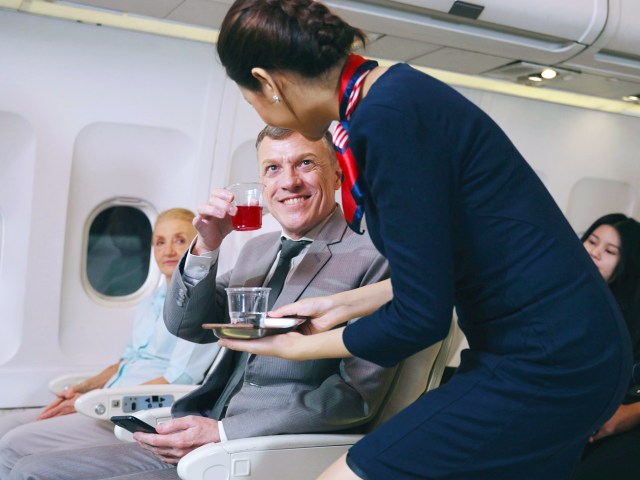
Even the most enthusiastic globe-trotters get worn out, but overall, the flight attendants we spoke to enjoy the constant adventure their career allows. “I know it sounds cliché, but I really did become a flight attendant because I love to travel,” Kaitlyn reflects. “I remember being on a flight to Hawaii and saying, ‘You know what, I want to be a flight attendant when I grow up.’”
Of course, every job comes with difficulties. In the case of flight attendants, those include long hours, unpredictable schedules, and lots of time away from home.
“My schedule constantly changes, from mornings to afternoons to nights,” Kaitlyn explains. “I often miss out on a lot. Even with my seniority, the schedule is the most difficult part.” So next time you board, be kind. The kickoff to your vacation might be the end of a stressful workweek for your flight attendant.
A Simple ‘Thank You’ Goes a Long Way
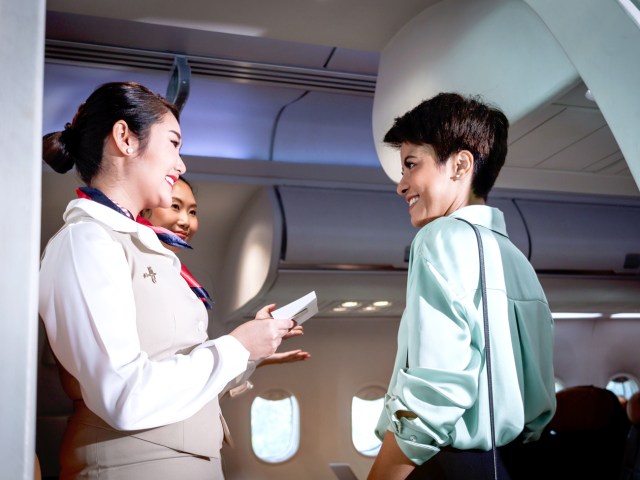
Flight attendants love it when passengers show their appreciation for the crew. A simple greeting or a “thank you” goes a long way in brightening their day.
If you enjoyed your flight, let them know. “If you have a good experience, make sure you write a compliment letter to the company. We get way too many complaint letters and not enough compliments,” Cate says.
Kaitlyn mentions that some passengers bring small gifts and snacks — “chocolates, coffee gift cards, money for tips for our van drivers.” However, they all agree the most meaningful thanks come from making their jobs easier by following instructions and being patient.
While many flight attendants certainly enjoy the perks of free flights and the chance to explore new cities, the flight attendants we interviewed shared that what truly excites them is connecting with passengers every day. Whether calming nervous flyers, celebrating with honeymooners, or making kids’ first flights memorable, being a reassuring and comforting presence at the start and finish of your vacation is at the heart of their work.
More from our network
Daily Passport is part of Inbox Studio, an email-first media company. *Indicates a third-party property.






